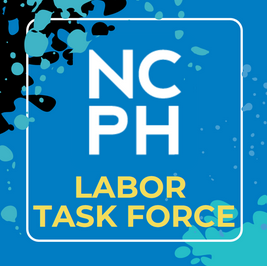Keeping public history accessible: the NCPH Labor Task Force
24 February 2025 – Alena Pirok
Editor’s Note: This post is the first in a 2025 History@Work series authored by members of the NCPH Labor Task Force in response to our Special Open Call on “#Advocacy in the Field”. You can read each post as it’s published throughout the year under H@W‘s #Advocacy tag.
Public historians have the coolest jobs. We get to touch historical objects. Read archival documents. Repair and interpret unique homes and sites. Share what we know, discuss with our peers, and help people find depth and beauty in humanity’s story. But a great many of us do not get paid well. Employers ask us to give more and more emotional, physical, and intellectual labor, without increases in our compensation. At all levels of the profession, we are expected to live with instability in exchange for having cool jobs.
These may seem like small or temporary issues for more senior public historians. Many of us were poor students or broke early career professionals who worked our way into more stable positions. The 2019 AASLH-AHA-NCPH-OAH Task Force on Public History Education and Employment reported a hopeful stability. But the field has changed dramatically since COVID; it is more difficult for emerging public historians, especially those without significant familial financial support, to survive the years of expensive training and temporary no or low-paid work. The increased costs for university training coupled with the continued job instability and low pay threatens to make public history careers less and less accessible for the children of the working class. We are faced with the reality that our profession and our method of people-first engagement with the past are in danger of becoming another inaccessible aspect of twenty-first-century life.
The National Council of Public History is especially well suited to address this issue. Our professional association is remarkably diverse. We are interpreters, managers, and scholars occupying a dizzying array of professional positions at all levels. Our dedication to seeing each other as colleagues is a powerful act of class solidarity and one of our greatest potential strengths.
In 2023, Andy Urban, Associate Professor of American Studies at Rutgers, and I created a working group called “Empowering the Public History Workplace: Information, Advocacy, and Salary,” to find out what the public history community needed to know and already knew about labor. At the core of our project was a desire to recognize public historians as workers—to discuss the issues public historians faced and how we advocate for ourselves and each other. Later that year, NCPH’s Long-Range Planning Committee created the Labor Task Force to address labor issues within the field. The two groups merged and grew.

NCPH Labor Task Force Logo. Created by Alena Pirok
Over the past year, the Labor Task Force has been organizing and planning. We have gathered some best practices for public history employers, compiled resources for public history employees, put together conference sessions, and today we are launching a series of blog posts. Over the next few months, members of the Labor Task Force will be focusing on a wide variety of workplace and labor issues. Some will be guides (like Bonnie McDonald’s post on employer best practices) and inspiring histories (like Heather Brugel’s history of labor in Detroit). Others will be reports of ongoing action like John Fulton’s post on the unionization of cultural workers at the Denver Art Museum, or Adam Rizzo’s exploration of the possible consequences that HR 9495, the Stop Terror Financing and Tax Penalties on American Hostages Act, will have on cultural institutions. We hope the series sparks conversations about the role of public history as labor in the classroom and the breakroom, empowering us to protect each other and demand bread with our roses.
Explore our Employer and Employee resources.
Please feel free to email me (apirok [@]georgiasouthern.edu) with comments or additions.
~ Alena Pirok is the chair of the NCPH Labor Task Force and Associate Professor of History at Georgia Southern University. She is the author of The Spirit of Colonial Williamsburg: Ghosts and Interpreting the Recreated Past (2022), and a contributing author to Branching Out: The Public History of Trees (2025) and Critical Theories in Dark Tourism (2025). Her work has been published in The Public Historian, The Florida Historical Quarterly, and Southern Cultures.



